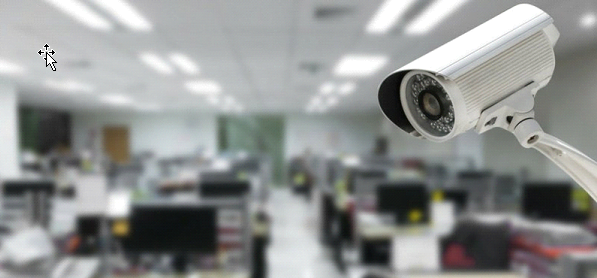In this day and age, the idea that “they’re watching you” is, unfortunately, not science fiction or paranoia. It’s 100% real and completely unavoidable in America: stores, parking lots, and even the streets are prime spots for the populace to be monitored and recorded. And now, the unsettling trend of employers survielling workers is on the rise.
It’s not just a matter of setting up a big, clunky video camera: nowadays, companies are availing themselves of the latest digital technology to monitor their employees. They’re using high-definition cameras, time-tracking software and even so-called “smart” equipment with the ability keep tabs on employees 24/7. It’s been a boon for the firms that sell this equipment, but not so welcome among employees who are concerned about their right to privacy.
And if you think your computer use is free from surveillance, you’re wrong: keystroke monitors are often being used to check every stroke on your keyboard, your e-mail messages are probably being reviewed, and what’s on your screen is likely being monitored without you even knowing it or giving your consent.

Courtesy of mydoorsign.com
Employee surveillance is not a new phenomenon, but it’s getting out of hand as companies find more and more excuses to track their workers’ every move. But these excuses all come down to one thing: the bottom line – they think all of this monitoring is going to make workers more productive.
Are they right about this? Maybe in some cases: errors, slacking off, theft, and other problems may be caught on camera through employee surveillance. But what is the net effect of all this monitoring and recording of these workers? What does it do to employee morale, and how does the increase in employee stress impact worker productivity?
93% Of Investors Generate Annual Returns, Which Barely Beat Inflation.
Wealth Education and Investment Principles Are Hidden From Public Database On Purpose!
Build The Knowledge Base To Set Yourself Up For A Wealthy Retirement and Leverage The Relationships We Are Forming With Proven Small-Cap Management Teams To Hit Grand-Slams!
We also might wonder whether these invasive practices are even legal, given that the Fourth Amendment of the U.S. Constitution protects Americans from unreasonable search and seizure. The thing is, it only constrains the government’s actions; it’s typically not illegal for companies to conduct spying activity within their own private property.
The problem is that how we define the company’s “property” is murky. If you’re conducting business on behalf of your employer but you’re using your own vehicle to do so, should the company be allowed to monitor your activities then? How about if you’re using your own cell phone to do company-related business: it is okay for the company to listen in and record your phone calls?

Courtesy of vitacompanies.com
Plus, companies need to consider how constant employee surveillance affects creativity. Most employers claim to want out-of-the-box thinking for their workers, but constant tracking tends to force identical work habits in employees. When the employer treats the workplace like a police state, the workforce is homogenized because they’re constantly in a state of fear – not the ideal environment for creating thinking.
It’s a major issue that touches upon the basic human need to live reasonably comfortably and free of constant fear. When the right of mega-corporations to spy on workers takes primacy over common-sense principles of basic privacy and human dignity, it’s a scary time for America.
Governments Have Amassed ungodly Debt Piles and Have Promised Retirees Unreasonable Amounts of Entitlements, Not In Line with Income Tax Collections. The House of Cards Is Set To Be Worse than 2008! Rising Interest Rates Can Topple The Fiat Monetary Structure, Leaving Investors with Less Than Half of Their Equity Intact!
